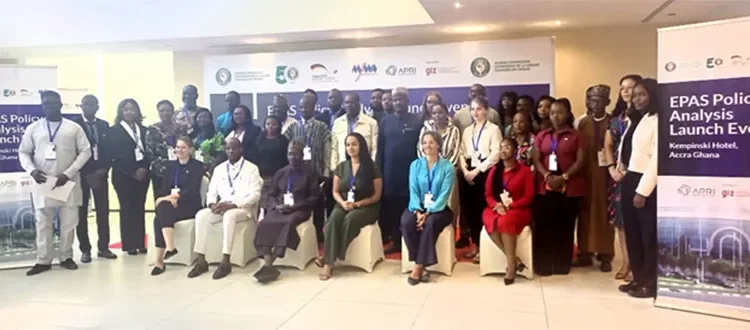Officials present at the launch of EPAS
The Economic Community of West African States (ECOWAS) has launched the ECOWAS Policy Analysis Series (EPAS), a comprehensive examination of the organisation’s strengths, weaknesses, opportunities, and threats, offering actionable insights to promote regional integration, democracy, and economic growth in West Africa.
The ECOWAS Commission, with financial and technical support from the German Development Cooperation Agency, has commissioned the Africa Policy Research Institute for the development of the 14 policy papers to comprehensively stimulate debates around ECOWAS’ 50th anniversary.
Comprising 14 policy papers developed by the Africa Policy Research Institute with financial and technical support from the German Development Cooperation Agency, the EPAS offers actionable insights and recommendations to enhance ECOWAS’ ability to promote regional integration, democracy, and economic growth in West Africa.
ECOWAS Resident Representative in Ghana, Ambassador Mohammed Lawan Gana, speaking on behalf of the ECOWAS president, stated that, the agenda prioritises the shift from ECOWAS of states to ECOWAS of the people, with inclusive sustainable development programmes.
According to him, citizen voices and civil society are fundamental to the development of democracy and democratic institutions. “At 50, ECOWAS is reeling under a fiercely competitive and rapidly changing global environment,” he stated.
He emphasised that, some challenges in the ECOWAS journey, include, uneven implementation of integration policies, infrastructure and connectivity gaps, security and governance challenges, limited economic diversification, and climate and employment vulnerability.
“To address these challenges, there is a need for a renewed commitment by community citizens, national governments, and all stakeholders to realise ECOWAS’ regional integration policies and programmes,” he reiterated.
Ambassador Lawan Gana outlined some key recommendations to overcome the challenges, including strengthening policy harmonisation and compliance, empowering youth and civil society, promoting regional trade and value chains, and integrating climate resilience and green jobs.
According to the Representative from German Embassy in Ghana, Chantel Kristin Bredua Lahmer, citizen engagement is crucial as their voices offer valuable insights into ground realities and community needs, enabling more effective and responsive governance.
“Civil society organisations also play a very important role in these perspectives and also making sure they are represented in decision-making processes,” she added.
She explained that, involving citizens strengthens the legitimacy of institutions and also increases public trust.
Furthermore, she emphasised that, it also contributes to more effective service delivery, which is very important, as policies become more aligned with the actual needs of the population on the ground. Strong democratic institutions depend on dialogue, transparency and accountability.
Ms. Kristin Bredua, lamented that, effective communication is a responsibility, not an option. In this era of declining public trust and rampant misinformation, fostering open dialogue and building relationships is essential for long-term success.
According to her, this year marks two significant milestones: the 50th anniversary of ECOWAS and 50 years of German bilateral development cooperation with Ghana. Both anniversaries highlight the importance of enduring regional partnerships and shared commitment.
“The policy papers presented reflect a wide diversity of views and experiences across West Africa and the diaspora. They offer practical ideas of how ECOWAS can become more citizen-centred and responsive to the challenges on the ground. This closely aligns with the ECOWAS Vision 2050, which aims to transform an ECOWAS of the states to become an ECOWAS of the people,” she underscored.
“As we embark on this event, we should consider how ECOWAS can continue to build institutional capacity, engage with global and regional dynamics, and improve its mechanisms for listening to citizens and responding to their concerns. Being a representative of the German Embassy in Ghana, I would like to highlight that Germany always remains a reliable partner to ECOWAS in this regard,” she noted.
For his part, Director of Media for Peace and Social Cohesion at the Media Foundation for West Africa, Dr. Kojo Impraim, disclosed that, ECOWAS has made significant progress in conflict prevention, mediation, and promoting democratic values.
However, he lamented that, challenges persist, including cybersecurity threats, misinformation, and climate change.
“We need a strong media to help navigate these challenges and promote democratic values,” he said.
“Our partnership with ECOWAS aims to enhance media capacity, promote media freedom, and improve access to information,” he mentioned.
By Janet Odei Amponsah


